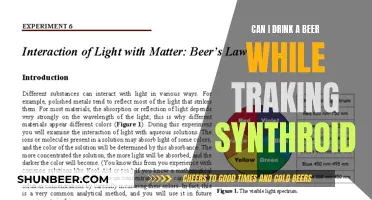
Alcohol is a central nervous system depressant, which acts as a sedative and slows down brain activity. While a glass of beer or wine may help you fall asleep, it can ultimately lead to disrupted sleep and tiredness the next day. Alcohol can negatively impact sleep quality in several ways, including enhancing the brain's levels of the sleep-inducing chemical adenosine, interrupting REM sleep, and affecting the body's melatonin production. Experts recommend avoiding alcohol close to bedtime, with some suggesting at least a three-to-four-hour gap before sleeping to allow the body to metabolise the alcohol.
| Characteristics | Values |
|---|---|
| Effect on sleep quality | Decreases sleep quality |
| Effect on sleep cycle | Reduces REM sleep and increases NREM sleep |
| Effect on sleep disorders | Can cause or aggravate sleep disorders such as insomnia, sleep apnea, and snoring |
| Effect on sleep duration | Can lead to shorter sleep time and frequent awakenings |
| Effect on sleep onset | Can help people fall asleep faster |
| Effect on sleep architecture | Alters sleep architecture |
| Effect on sleep fragmentation | Can lead to more fragmented and lighter sleep |
| Effect on sleep latency | Increases sleep latency |
| Effect on sleep arousals | Increases sleep arousals |
| Effect on sleepwalking | Can cause sleepwalking |
| Effect on dreams | Can cause intense dreams and nightmares |
| Effect on sleep duration | Can lead to longer sleep times or oversleeping |
| Effect on sleep environment | Can cause night sweats |
| Effect on sleep preparation | Should be avoided 3-4 hours before bedtime |
What You'll Learn
- Alcohol disrupts the sleep cycle by altering the balance of NREM and REM sleep
- It can lead to sleepwalking, intense dreams, and sleep apnea
- Alcohol negatively impacts sleep quality, even in moderate amounts
- Drinking close to bedtime is particularly detrimental to sleep
- Alcohol can cause frequent urination, disrupting sleep

Alcohol disrupts the sleep cycle by altering the balance of NREM and REM sleep
When you go to bed with alcohol in your system, you're likely to experience more N3 sleep, or "deep sleep," and less REM sleep than usual, at least initially. Later in the night, once your body has metabolized the alcohol, you're likely to experience a rise in N1 sleep, the lightest stage of sleep. This can lead to frequent wakings and fragmented, low-quality sleep.
Alcohol's effects on sleep can be both acute, or immediate, and chronic, affecting heavy drinkers in the long term. Acute administration of large amounts of alcohol prior to sleep leads to decreased sleep onset latency and changes in sleep architecture early in the night when blood alcohol levels are high, with subsequent disrupted, poor-quality sleep later in the night.
Chronic alcohol abuse and dependence are associated with long-term sleep disturbances, lower slow-wave sleep, and more REM sleep than normal, lasting long into periods of abstinence and potentially playing a role in relapse. Studies have shown that alcohol abuse leads to long-lasting neurochemical changes in the brainstem, which may explain the increase in REM sleep observed in long-term abstinent alcoholics.
Overall, alcohol consumption disrupts the balance of NREM and REM sleep, leading to alterations in sleep architecture and poor sleep quality.
Mixing Beer and Cough Medicine: Is It Safe?
You may want to see also

It can lead to sleepwalking, intense dreams, and sleep apnea
Drinking beer can have a significant impact on sleep quality and can lead to various sleep disorders, including sleepwalking, intense dreams, and sleep apnea.
Sleepwalking
Excessive alcohol consumption has been linked to sleepwalking and confusional arousal. While there is limited direct evidence that alcohol triggers sleepwalking, some studies have found a modest increase in slow-wave sleep (SWS) in the first few hours after drinking. Sleepwalking can have legal implications, as those who commit criminal acts while sleepwalking may be acquitted due to a lack of conscious awareness and criminal intent.
Intense Dreams
Drinking beer can also lead to intense dreams. According to dream interpretation, seeing or drinking beer in a dream can signify good times ahead, especially if the beer is fresh and foamy. However, flat or unpleasant-tasting beer in a dream may serve as a warning about deception or impending challenges.
Sleep Apnea
Alcohol consumption has a complex relationship with sleep apnea, a disorder characterised by repeated pauses in breathing during sleep. Drinking alcohol can worsen snoring and increase the risk of developing sleep apnea. Alcohol relaxes the muscles in the airway, leading to obstructions in the upper airway and disrupted breathing. This can result in loud snoring, gasping for air, and daytime sleepiness. Both central sleep apnea, a central nervous system disorder, and obstructive sleep apnea (OSA), the most common type, can be exacerbated by alcohol consumption. Alcohol slows down the central nervous system, leading to more frequent apnea episodes in central sleep apnea. In OSA, alcohol relaxes the airway muscles and causes nasal congestion, making breathing more difficult.
In summary, drinking beer can have notable effects on sleep, including sleepwalking, intense dreams, and an increased risk of sleep apnea. These disruptions can impact overall sleep quality and contribute to sleep disorders.
Beer: A Carbohydrate Conundrum for Dieters?
You may want to see also

Alcohol negatively impacts sleep quality, even in moderate amounts
Firstly, alcohol enhances the brain's levels of the chemical adenosine, which can lead to sleepiness. However, as the body metabolises the alcohol, the sedating effect wears off, leading to a "rebound effect" of lighter, more disrupted sleep. This can result in frequent, short awakenings throughout the night.
Secondly, alcohol can interrupt rapid eye movement (REM) sleep, which is important for dreaming, learning, and memory processing. It reduces REM sleep and increases non-rapid eye movement (NREM) sleep, leading to a change in the normal sleep cycle that can cause sleepwalking, intense dreams, nightmares, and even sleep apnea. Sleep apnea occurs when breathing briefly pauses during sleep, and alcohol can worsen this condition by relaxing the muscles in the throat.
Thirdly, alcohol can affect the body's production of melatonin, a hormone that regulates sleep. Binge drinking, or consuming large amounts of alcohol quickly, can alter melatonin levels for up to a week afterward. This can further disrupt sleep patterns and contribute to sleep disorders.
Additionally, alcohol can cause frequent urination, leading to more nighttime awakenings. It can also dehydrate the body, affecting its ability to recover during sleep. To counteract this, it is recommended to drink water or electrolytes before bed and stay hydrated throughout the day.
The negative impact of alcohol on sleep quality can lead to a vicious cycle. As a result of disrupted sleep, individuals may turn to stimulants like caffeine to stay awake during the day. However, caffeine consumption can then make it harder to fall asleep at night, leading them to rely on alcohol as a sleep aid, and the cycle continues.
Overall, while alcohol may initially make you feel drowsy, it can significantly disrupt sleep quality and leave you feeling tired the next day. To mitigate these effects, it is recommended to avoid consuming alcohol within four hours of bedtime and practise good sleep hygiene, such as sticking to a regular sleep schedule and avoiding blue light before bed.
The Magic of Beer Randall: Infusing Beers with Flavors
You may want to see also

Drinking close to bedtime is particularly detrimental to sleep
Firstly, alcohol affects the quality of your sleep. It reduces REM sleep and increases NREM sleep. REM sleep is the restorative phase of sleep, when your brain consolidates memories and dreams. NREM sleep is the deeper phase of sleep, and while it may feel restful, it does not have the same restorative benefits as REM sleep. Alcohol can also cause sleepwalking, intense dreams, nightmares, and sleep apnea.
Secondly, drinking close to bedtime can lead to frequent awakenings. This is because it takes approximately one hour for your body to process one serving of alcohol. If you have had several drinks, it is best to allow several hours before going to bed. If you go to bed with alcohol still in your system, you may experience headaches, night sweats, and frequent awakenings.
Thirdly, drinking close to bedtime can affect your sleep cycle. Alcohol can decrease your body's sensitivity to cues like daylight and darkness, which trigger shifts in body temperature and the secretion of the sleep hormone melatonin. This can cause you to feel alert when you want to sleep and sleepy when you want to be awake.
Finally, drinking close to bedtime can lead to a vicious cycle of poor sleep and increased alcohol and caffeine consumption. When you don't sleep well, you may turn to caffeine to stay awake during the day. Then, to counteract the stimulating effects of caffeine, you may rely on alcohol to help you fall asleep. Over time, you may develop a tolerance to alcohol, which can lead to alcohol dependence.
Beer and High Blood Pressure: Safe to Drink?
You may want to see also

Alcohol can cause frequent urination, disrupting sleep
Alcohol is a diuretic, which means drinking it can make you need to urinate more frequently. This can be disruptive to sleep, as you may need to get up to go to the bathroom during the night.
Alcohol is broken down by enzymes in the liver, and it can take an hour for the body to process a single serving of alcohol. If you have several drinks, it's best to finish your last drink several hours before bed.
If you don't wait long enough between your last drink and going to sleep, you may experience frequent awakenings, night sweats, more intense snoring, and nightmares. This is because alcohol disrupts the normal deep sleep and rapid eye movement (REM) sleep cycles, which can lead to shorter sleep time and more fragmented and lighter sleep.
Research has shown that alcohol can decrease sleep quality by 9.3% with one serving, and up to 39.2% with more than two servings. It can also cause a "rebound effect", where you experience lighter, more disrupted sleep as the sedating effect wears off.
Overall, while alcohol may help you fall asleep initially, it will likely disrupt your sleep later in the night.
Na Beer: A Drinkers' Solution or Temporary Fix?
You may want to see also
Frequently asked questions
Yes, drinking beer can keep you awake. While alcohol can make you feel tired initially, it can disturb your sleep as it wears off.
Drinking beer before bed can lead to frequent wakings, night sweats, more intense snoring, and nightmares. It can also negatively impact your sleep cycle by reducing REM sleep and increasing NREM sleep.
It is recommended to wait at least three to four hours after drinking beer before going to bed to allow your body to fully process the alcohol.
Regularly drinking beer before bed can lead to chronic sleep problems, such as insomnia and sleep apnea, and can also disrupt your circadian rhythm.
Yes, instead of drinking beer, you can try non-alcoholic alternatives, drinking water or electrolytes, or improving your sleep hygiene by sticking to a consistent sleep schedule and avoiding blue light before bed.







